Unit 11 How was your school trip Period 4 Section B (2a-2c)课件(共46张PPT)
文档属性
| 名称 | Unit 11 How was your school trip Period 4 Section B (2a-2c)课件(共46张PPT) | 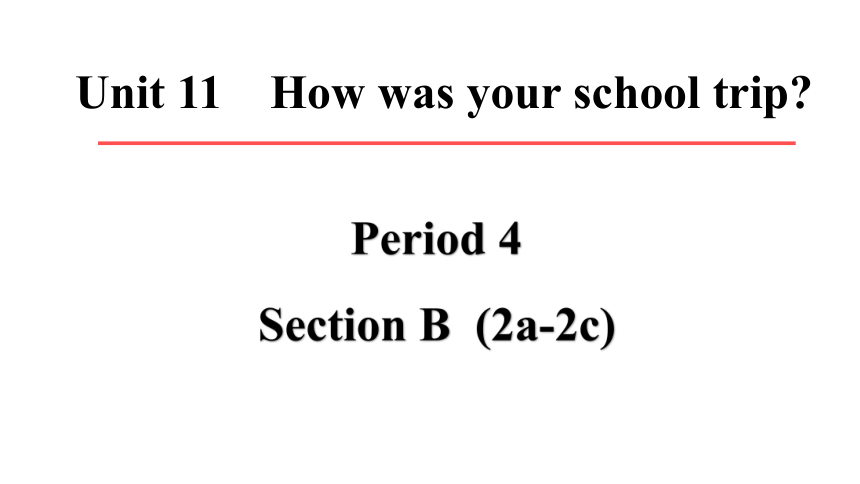 | |
| 格式 | pptx | ||
| 文件大小 | 17.2MB | ||
| 资源类型 | 教案 | ||
| 版本资源 | 人教新目标(Go for it)版 | ||
| 科目 | 英语 | ||
| 更新时间 | 2023-12-17 08:49:25 | ||
图片预览

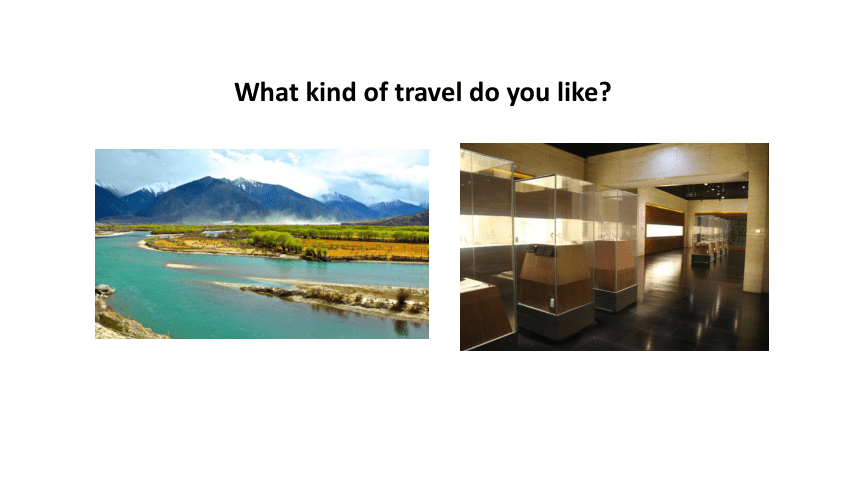
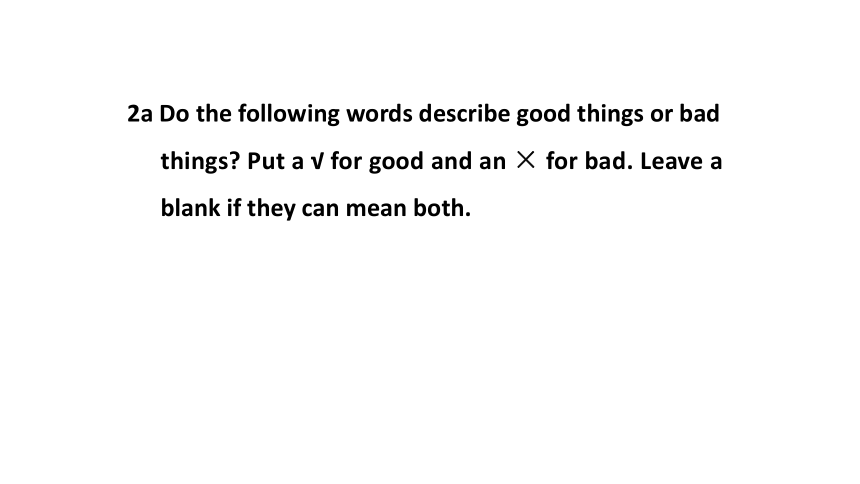
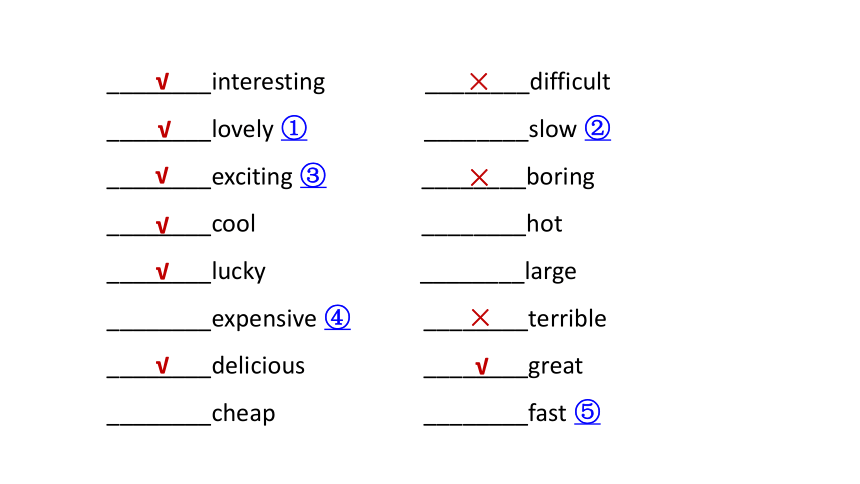
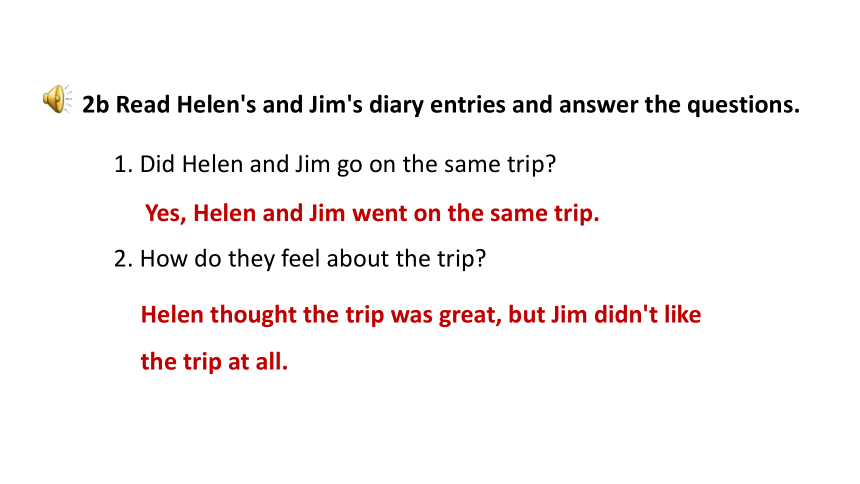
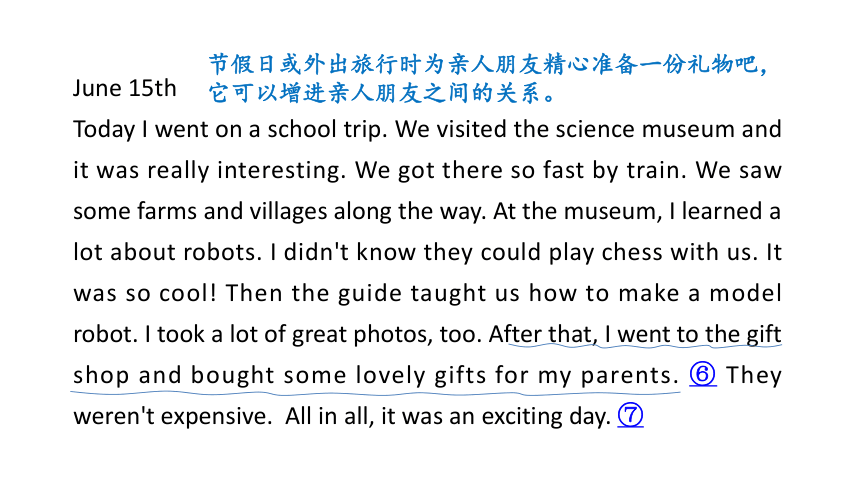
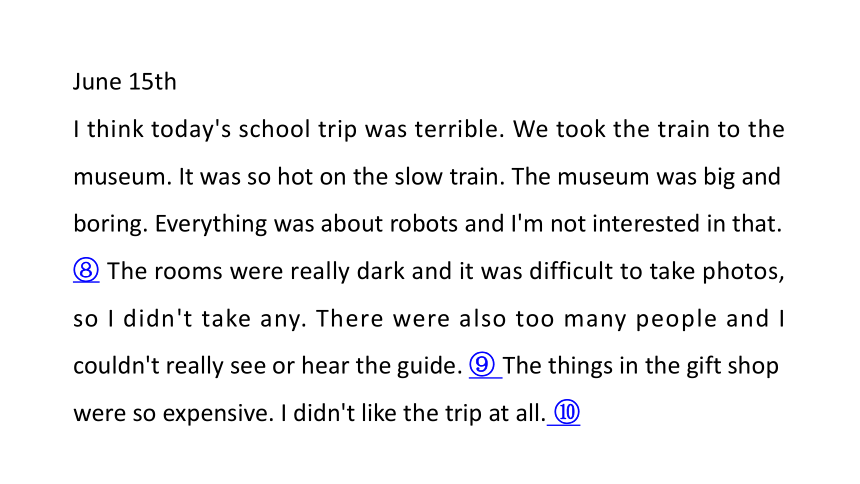
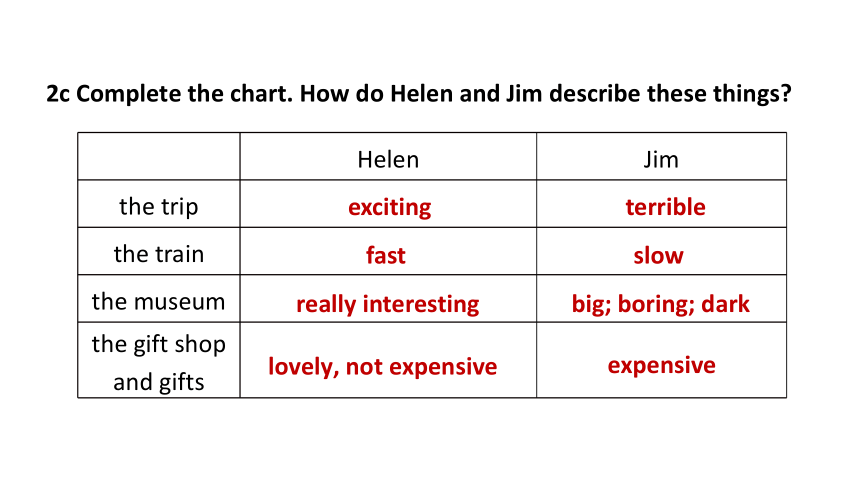
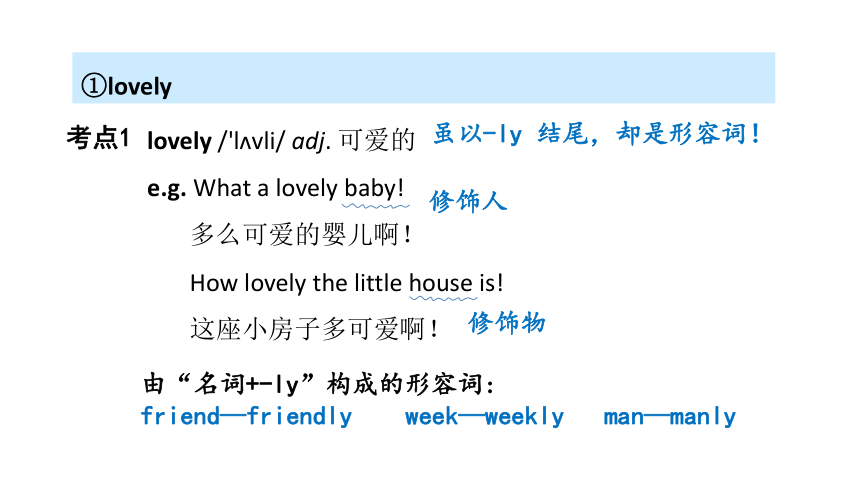
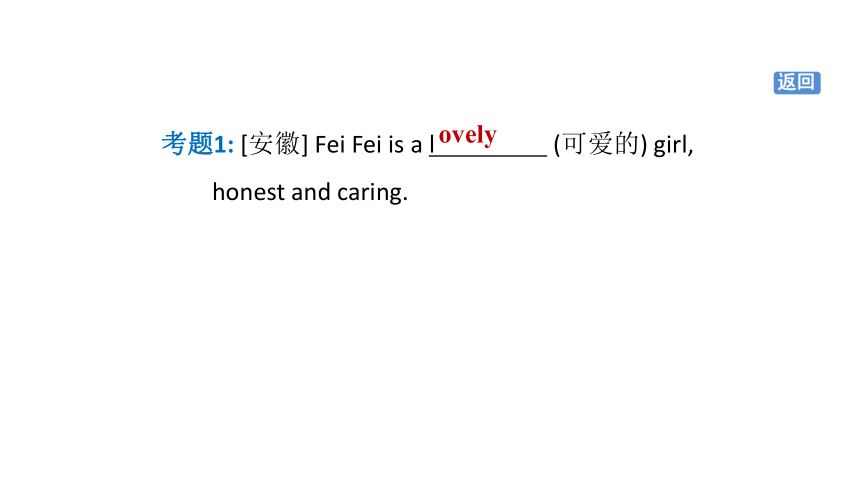
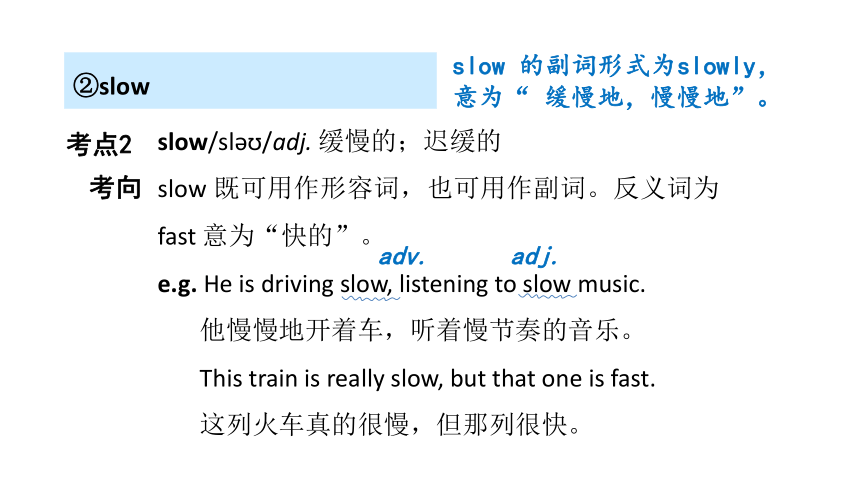
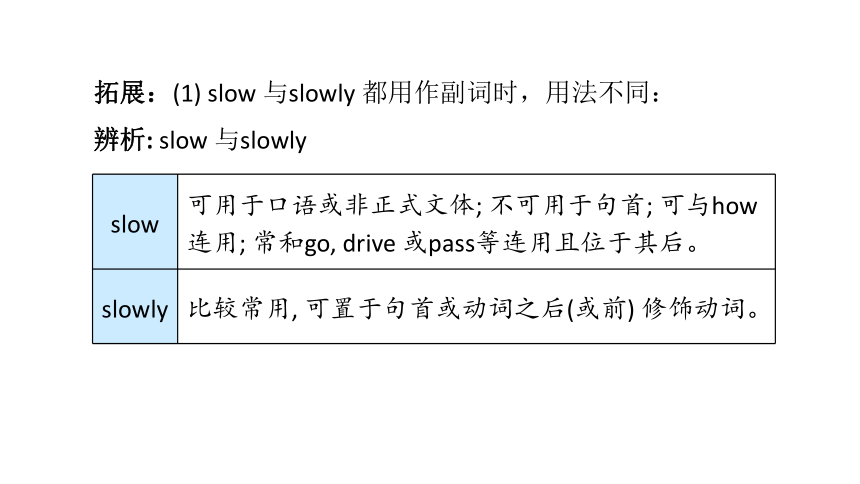
文档简介
(共46张PPT)
Period 4
Section B (2a-2c)
Unit 11 How was your school trip
What kind of travel do you like
2a Do the following words describe good things or bad things Put a √ for good and an × for bad. Leave a blank if they can mean both.
________interesting ________difficult
________lovely ① ________slow ②
________exciting ③ ________boring
________cool ________hot
________lucky ________large
________expensive ④ ________terrible
________delicious ________great
________cheap ________fast ⑤
√
×
×
×
√
√
√
√
√
√
2b Read Helen's and Jim's diary entries and answer the questions.
1. Did Helen and Jim go on the same trip
2. How do they feel about the trip
Yes, Helen and Jim went on the same trip.
Helen thought the trip was great, but Jim didn't like the trip at all.
June 15th
Today I went on a school trip. We visited the science museum and it was really interesting. We got there so fast by train. We saw some farms and villages along the way. At the museum, I learned a lot about robots. I didn't know they could play chess with us. It was so cool! Then the guide taught us how to make a model robot. I took a lot of great photos, too. After that, I went to the gift shop and bought some lovely gifts for my parents. ⑥ They weren't expensive. All in all, it was an exciting day. ⑦
节假日或外出旅行时为亲人朋友精心准备一份礼物吧,它可以增进亲人朋友之间的关系。
June 15th
I think today's school trip was terrible. We took the train to the museum. It was so hot on the slow train. The museum was big and boring. Everything was about robots and I'm not interested in that. ⑧ The rooms were really dark and it was difficult to take photos, so I didn't take any. There were also too many people and I couldn't really see or hear the guide. ⑨ The things in the gift shop were so expensive. I didn't like the trip at all. ⑩
2c Complete the chart. How do Helen and Jim describe these things
Helen Jim
the trip
the train
the museum
the gift shop and gifts
exciting
fast
really interesting
lovely, not expensive
terrible
slow
big; boring; dark
expensive
①lovely
lovely /'l vli/ adj. 可爱的
e.g. What a lovely baby!
多么可爱的婴儿啊!
How lovely the little house is!
这座小房子多可爱啊!
考点1
虽以-ly 结尾,却是形容词!
由“名词+-ly”构成的形容词:
friend—friendly week—weekly man—manly
修饰人
修饰物
考题1: [安徽] Fei Fei is a l (可爱的) girl, honest and caring.
ovely
返回
②slow
slow/sl /adj. 缓慢的;迟缓的
slow 既可用作形容词,也可用作副词。反义词为fast 意为“快的”。
e.g. He is driving slow, listening to slow music.
他慢慢地开着车,听着慢节奏的音乐。
This train is really slow, but that one is fast.
这列火车真的很慢,但那列很快。
考点2
slow 的副词形式为slowly, 意为“ 缓慢地,慢慢地”。
adv. adj.
考向
拓展:(1) slow 与slowly 都用作副词时,用法不同:
辨析: slow 与slowly
slow 可用于口语或非正式文体; 不可用于句首; 可与how连用; 常和go, drive 或pass等连用且位于其后。
slowly 比较常用, 可置于句首或动词之后(或前) 修饰动词。
e.g. How slow the time passes! 时间过得真慢啊!
I told the driver to go slow. 我告诉司机慢慢开车。
Slowly things began to improve. 慢慢地,情况开始好转了。
She is working slowly. 她在慢慢地工作。
He slowly opened the door. 他慢慢地打开了门。
(2) slow 还可以作动词,意为“减速;慢下来”。
e.g. Slow down and stop at a yellow light.
遇到黄灯时要减速并停下。
考题2: [德阳] The doctor said, “You must walk s because of your leg wound.”
返回
【点拨】用语法分析法。由空格后“由于你的腿伤”可知,此处表示“慢慢走”;修饰动词walk 要用副词。
lowly
③exciting
exciting/ ksa t /adj. 使人兴奋的; 令人激动的
e. g. What an exciting movie that is!
那是多令人激动的一部电影啊!
I’m excited at the exciting news.
这个令人兴奋的消息令我感到兴奋。
考点3
exciting 以元音音素开头,不定冠词用an。
辨析: exciting 与excited
exciting “使人兴奋的”, 常作定语或表语, 作表语时, 主语通常是物, 强调事物所拥有的特征。
excited “兴奋的”, 常作表语, 主语通常是人, 强调人的情绪。
考题3: [营口] The ______ news made him ______. He didn’t fall asleep until midnight.
A. excited;excited B. exciting;exciting
C. exciting;excited D. excited;exciting
C
返回
④expensive
expensive/ kspens v/ adj. 昂贵的
e. g. This is an expensive car. 这是一台昂贵的车。
There must be something expensive in the box.
盒子里一定有贵重的东西。
考点4
expensive 以元音音素开头,前有不定冠词时用
an。expensive 相当于dear。
辨析: expensive 与high
expensive 表示“昂贵的; 花钱多的”; 反义词cheap表示“廉价的; 便宜的”, 其主语必须是货物或物品本身。
high 表示价格“高”, 反义词low表示价格“低”, 其主语为price。
e. g. This car is expensive, but that one is cheap.
这辆小汽车昂贵, 但那辆便宜。
The price of this watch is very high.
这块手表的价格非常高。
速记小法:物品分贵(expensive)贱(cheap);
价格论高(high)低(low)
考题4: [山西] —The computer desk in the store is so ______ that I can’t afford it.
—Why not buy a second-hand one on the Internet
A. large B. heavy C. expensive
C
考题5: The price of the sweater is very _______. I can’t afford it.
A. expensive B. cheap
C. high D. low
C
返回
⑤fast
fast/fɑ st/adv. & adj. 快地(的)
fast 的具体用法:
考点5
fast adv. “快地”
e.g. Sound travels very fast. 声音的传播速度很快。
adj. “快的”
e.g. Do you like fast food 你喜欢快餐吗?
fast 用作副词时,反义词是slowly/slow;用作形容词时反义词是slow。
考向
考题6: Don’t ride your bike too f , or you’ll hurt yourself.
返回
ast
⑥After that, I went to the gift shop. . .
gift/ɡ ft/n. 礼物; 赠品
e. g. Thanks for your gift. 谢谢你的礼物。
拓展:gift 作名词,还可意为“天赋;才能”。
e.g. He has the gift of making friends easily.
他天生善交朋友。
考点6
gift 是可数名词,同义词为present。
考题7: We bought some g for our teachers on Teachers’ Day.
返回
ifts
⑦All in all, it was an exciting day.
all in all 总的来说
考点7
in a word, 意为“总之;一句话”,也用于句首,后面用逗号隔开。
辨析: all in all, in all, after all与above all
all in all 意为“总的来说”, 常用于句首。
in all 意为“总共; 合计”, 既可放在句首, 也可放在句末。
after all 意为“毕竟; 终究”, 可位于句首、句中或句末。
above all 意为“尤其是; 最重要的是”, 常位于句首或句中作插入语。
e. g. All in all, the earth is our home and it’s our duty to protect it.
总的来说,地球是我们的家园,我们有责任保护它。
There are fifty students in all.
总共有50 名学生。
After all, we like the 5G network better.
毕竟,我们更喜欢5G 网络。
Above all, tell me quickly what I should do.
最重要的是,快点告诉我该做什么。
考题8: —How was your trip, Linda
—It rained at the beginning. But ______, it’s a nice trip.
A. above all B. in all
C. all in all D. at all
C
返回
⑧Everything was about robots and I’m not interested in that.
everything /'evriθ / pron. 所有事物;一切
everything 作主语时,谓语动词用第三人称单数。
e.g. Everything begins to grow and flowers come out.
万物开始生长,鲜花盛开。
Nothing stopped him from trying everything here.
没有什么阻止他尝试这里所有的东西。
考点8
反义词为nothing
考向
everything 是由“every + thing”构成,类似的单词有:
everybody人人/每个人
everyday 每日的
everywhere 到处;各个地方
考题9: [宿迁] — Sandy is well organized(有条理的).
—Exactly. _____ in her room is in good order(井井有条).
A. Something B. Everything
C. Nothing D. None
【点拨】用语境判定法。Something 某事物;Everything 每件事物,一切;Nothing 没有东西;None 没有一个。由语境可知,Everything符合句意。
B
be interested in... 对……感兴趣
be interested in... 相当于show/take an interest in,后接名词、代词或动词的-ing 形式。
e.g. Also, I am interested in Chinese culture.
此外,我对中国文化感兴趣。
She is interested in singing.
= She shows/takes an interest in singing.
她对唱歌感兴趣。
考点9
考向
辨析: interested 与interesting
interested “感兴趣的”, 表示人的主观感受。 作表语
interesting “有趣的; 有吸引力的”, 表示事物的特征。 作表语或定语
一语辨异:I’m interested in reading. I think it is interesting to read some interesting stories in my free time. 我对读书感兴趣。我觉得在空闲时读些有趣的故事很有趣。
返回
考题10: [福建] —How do you like my poem Moonlight
—I ______ it. It’s about the beauty of nature.
A. am interested in B. am worried about
C. am thankful for
【点拨】be interested in 对……感兴趣;be worried about
担心;be thankful for 对……表示感激。根据“It’s about the beauty of nature.”可知,此处表示对诗感兴趣。
A
⑨There were also too many people and I couldn’t really see or hear the guide.
hear /h /, /h r/ v. 听到;听见
hear 用作及物动词时,后接名词、代词或that 从句。
e.g. She can’t hear anything. 她什么也听不到。
I’m sorry to hear that you can’t come.
听说你不能来,我很遗憾。
考点10
考向
(过去式heard)
拓展:hear 用作感官动词,其后跟动词作宾语补足语时,动词常用do 或doing 形式。
用法 示例
hear sb. do sth. 听见某人做某事了或经常做某事 I often hear him practise playing the piano in the morning.
我经常听到他在早晨练习弹钢琴。
hear sb. doing sth. 听见某人正在做某事 Can you hear a girl singing a song 你能听到一个女孩正在唱歌吗?
与hear 相关的短语:
hear about 听到关于……(的消息)
hear from 收到……的来信
hear of 听说;得知
hear sb. out 听某人把话说完
考题11: —Can you hear someone ______ in the classroom
—It is Mary.
A. sing B. sings
C. singing D. sang
C
考题12: [恩施] 昨天早上,我很开心收到了多年未见的朋友的来信。(hear)
To my great joy, I __________ a friend whom I haven’t seen for years yesterday morning.
【点拨】由yesterday morning可知,本句是一般过去
时;固定短语hear from sb. 意为“收到某人的来信”,hear 的过去式为heard。
heard from
返回
⑩I didn’t like the trip at all.
not... at all 一点儿也不
e.g. Yesterday Mr. Brown wasn’t busy at all.
昨天布朗先生一点儿也不忙。
Andy doesn’t like junk food at all, so she never eats it.
安迪一点儿都不喜欢垃圾食品,所以她从来不吃。
I couldn’t hear you at all.
我根本听不到你说话。
考点11
not 和be 动词/助动词/情态动词连用使句子成为否定句,at all 位于句末。表示强烈的否定意味。
拓展:not at all 可用在不同场合中:
(1)用来回答感谢,意为“不用谢;不客气”。
e.g. — Thank you very much. 非常感谢你。— Not at all. 不客气。
(2) 用来回答道歉,意为“没关系”。
e.g. — I’m sorry. I’m late. 很抱歉。我迟到了。
— Not at all. 没关系。
(3)用来表示否定,意为“一点也不”。
e.g. — Are you busy 你很忙吗?— Not at all. 一点也不忙。
考题13: [武威] —Would you mind telling me how to start this machine
—_______. It’s very easy. Do it like this.
A. Yes, of course B. No, not at all
C. No, thanks D. Yes, you are right
B
返回
【点拨】用情景交际法。Yes, of course 是的,当然;No, not at all 不,根本不;No, thanks 不,谢谢;Yes, you are right 是的,你说得对。根据“It’s very easy. Do it like this.”可知,不介意。
本节课主要练习了听力, 学习了简和吉姆关于学校郊游活动的日记, 掌握了知识点lovely, slow, exciting, go on a school trip, taught us how to make a robot, expensive, all in all, everything, be interested in, hear, not at all等的用法, 并回答了与文章内容相关的问题。
Period 4
Section B (2a-2c)
Unit 11 How was your school trip
What kind of travel do you like
2a Do the following words describe good things or bad things Put a √ for good and an × for bad. Leave a blank if they can mean both.
________interesting ________difficult
________lovely ① ________slow ②
________exciting ③ ________boring
________cool ________hot
________lucky ________large
________expensive ④ ________terrible
________delicious ________great
________cheap ________fast ⑤
√
×
×
×
√
√
√
√
√
√
2b Read Helen's and Jim's diary entries and answer the questions.
1. Did Helen and Jim go on the same trip
2. How do they feel about the trip
Yes, Helen and Jim went on the same trip.
Helen thought the trip was great, but Jim didn't like the trip at all.
June 15th
Today I went on a school trip. We visited the science museum and it was really interesting. We got there so fast by train. We saw some farms and villages along the way. At the museum, I learned a lot about robots. I didn't know they could play chess with us. It was so cool! Then the guide taught us how to make a model robot. I took a lot of great photos, too. After that, I went to the gift shop and bought some lovely gifts for my parents. ⑥ They weren't expensive. All in all, it was an exciting day. ⑦
节假日或外出旅行时为亲人朋友精心准备一份礼物吧,它可以增进亲人朋友之间的关系。
June 15th
I think today's school trip was terrible. We took the train to the museum. It was so hot on the slow train. The museum was big and boring. Everything was about robots and I'm not interested in that. ⑧ The rooms were really dark and it was difficult to take photos, so I didn't take any. There were also too many people and I couldn't really see or hear the guide. ⑨ The things in the gift shop were so expensive. I didn't like the trip at all. ⑩
2c Complete the chart. How do Helen and Jim describe these things
Helen Jim
the trip
the train
the museum
the gift shop and gifts
exciting
fast
really interesting
lovely, not expensive
terrible
slow
big; boring; dark
expensive
①lovely
lovely /'l vli/ adj. 可爱的
e.g. What a lovely baby!
多么可爱的婴儿啊!
How lovely the little house is!
这座小房子多可爱啊!
考点1
虽以-ly 结尾,却是形容词!
由“名词+-ly”构成的形容词:
friend—friendly week—weekly man—manly
修饰人
修饰物
考题1: [安徽] Fei Fei is a l (可爱的) girl, honest and caring.
ovely
返回
②slow
slow/sl /adj. 缓慢的;迟缓的
slow 既可用作形容词,也可用作副词。反义词为fast 意为“快的”。
e.g. He is driving slow, listening to slow music.
他慢慢地开着车,听着慢节奏的音乐。
This train is really slow, but that one is fast.
这列火车真的很慢,但那列很快。
考点2
slow 的副词形式为slowly, 意为“ 缓慢地,慢慢地”。
adv. adj.
考向
拓展:(1) slow 与slowly 都用作副词时,用法不同:
辨析: slow 与slowly
slow 可用于口语或非正式文体; 不可用于句首; 可与how连用; 常和go, drive 或pass等连用且位于其后。
slowly 比较常用, 可置于句首或动词之后(或前) 修饰动词。
e.g. How slow the time passes! 时间过得真慢啊!
I told the driver to go slow. 我告诉司机慢慢开车。
Slowly things began to improve. 慢慢地,情况开始好转了。
She is working slowly. 她在慢慢地工作。
He slowly opened the door. 他慢慢地打开了门。
(2) slow 还可以作动词,意为“减速;慢下来”。
e.g. Slow down and stop at a yellow light.
遇到黄灯时要减速并停下。
考题2: [德阳] The doctor said, “You must walk s because of your leg wound.”
返回
【点拨】用语法分析法。由空格后“由于你的腿伤”可知,此处表示“慢慢走”;修饰动词walk 要用副词。
lowly
③exciting
exciting/ ksa t /adj. 使人兴奋的; 令人激动的
e. g. What an exciting movie that is!
那是多令人激动的一部电影啊!
I’m excited at the exciting news.
这个令人兴奋的消息令我感到兴奋。
考点3
exciting 以元音音素开头,不定冠词用an。
辨析: exciting 与excited
exciting “使人兴奋的”, 常作定语或表语, 作表语时, 主语通常是物, 强调事物所拥有的特征。
excited “兴奋的”, 常作表语, 主语通常是人, 强调人的情绪。
考题3: [营口] The ______ news made him ______. He didn’t fall asleep until midnight.
A. excited;excited B. exciting;exciting
C. exciting;excited D. excited;exciting
C
返回
④expensive
expensive/ kspens v/ adj. 昂贵的
e. g. This is an expensive car. 这是一台昂贵的车。
There must be something expensive in the box.
盒子里一定有贵重的东西。
考点4
expensive 以元音音素开头,前有不定冠词时用
an。expensive 相当于dear。
辨析: expensive 与high
expensive 表示“昂贵的; 花钱多的”; 反义词cheap表示“廉价的; 便宜的”, 其主语必须是货物或物品本身。
high 表示价格“高”, 反义词low表示价格“低”, 其主语为price。
e. g. This car is expensive, but that one is cheap.
这辆小汽车昂贵, 但那辆便宜。
The price of this watch is very high.
这块手表的价格非常高。
速记小法:物品分贵(expensive)贱(cheap);
价格论高(high)低(low)
考题4: [山西] —The computer desk in the store is so ______ that I can’t afford it.
—Why not buy a second-hand one on the Internet
A. large B. heavy C. expensive
C
考题5: The price of the sweater is very _______. I can’t afford it.
A. expensive B. cheap
C. high D. low
C
返回
⑤fast
fast/fɑ st/adv. & adj. 快地(的)
fast 的具体用法:
考点5
fast adv. “快地”
e.g. Sound travels very fast. 声音的传播速度很快。
adj. “快的”
e.g. Do you like fast food 你喜欢快餐吗?
fast 用作副词时,反义词是slowly/slow;用作形容词时反义词是slow。
考向
考题6: Don’t ride your bike too f , or you’ll hurt yourself.
返回
ast
⑥After that, I went to the gift shop. . .
gift/ɡ ft/n. 礼物; 赠品
e. g. Thanks for your gift. 谢谢你的礼物。
拓展:gift 作名词,还可意为“天赋;才能”。
e.g. He has the gift of making friends easily.
他天生善交朋友。
考点6
gift 是可数名词,同义词为present。
考题7: We bought some g for our teachers on Teachers’ Day.
返回
ifts
⑦All in all, it was an exciting day.
all in all 总的来说
考点7
in a word, 意为“总之;一句话”,也用于句首,后面用逗号隔开。
辨析: all in all, in all, after all与above all
all in all 意为“总的来说”, 常用于句首。
in all 意为“总共; 合计”, 既可放在句首, 也可放在句末。
after all 意为“毕竟; 终究”, 可位于句首、句中或句末。
above all 意为“尤其是; 最重要的是”, 常位于句首或句中作插入语。
e. g. All in all, the earth is our home and it’s our duty to protect it.
总的来说,地球是我们的家园,我们有责任保护它。
There are fifty students in all.
总共有50 名学生。
After all, we like the 5G network better.
毕竟,我们更喜欢5G 网络。
Above all, tell me quickly what I should do.
最重要的是,快点告诉我该做什么。
考题8: —How was your trip, Linda
—It rained at the beginning. But ______, it’s a nice trip.
A. above all B. in all
C. all in all D. at all
C
返回
⑧Everything was about robots and I’m not interested in that.
everything /'evriθ / pron. 所有事物;一切
everything 作主语时,谓语动词用第三人称单数。
e.g. Everything begins to grow and flowers come out.
万物开始生长,鲜花盛开。
Nothing stopped him from trying everything here.
没有什么阻止他尝试这里所有的东西。
考点8
反义词为nothing
考向
everything 是由“every + thing”构成,类似的单词有:
everybody人人/每个人
everyday 每日的
everywhere 到处;各个地方
考题9: [宿迁] — Sandy is well organized(有条理的).
—Exactly. _____ in her room is in good order(井井有条).
A. Something B. Everything
C. Nothing D. None
【点拨】用语境判定法。Something 某事物;Everything 每件事物,一切;Nothing 没有东西;None 没有一个。由语境可知,Everything符合句意。
B
be interested in... 对……感兴趣
be interested in... 相当于show/take an interest in,后接名词、代词或动词的-ing 形式。
e.g. Also, I am interested in Chinese culture.
此外,我对中国文化感兴趣。
She is interested in singing.
= She shows/takes an interest in singing.
她对唱歌感兴趣。
考点9
考向
辨析: interested 与interesting
interested “感兴趣的”, 表示人的主观感受。 作表语
interesting “有趣的; 有吸引力的”, 表示事物的特征。 作表语或定语
一语辨异:I’m interested in reading. I think it is interesting to read some interesting stories in my free time. 我对读书感兴趣。我觉得在空闲时读些有趣的故事很有趣。
返回
考题10: [福建] —How do you like my poem Moonlight
—I ______ it. It’s about the beauty of nature.
A. am interested in B. am worried about
C. am thankful for
【点拨】be interested in 对……感兴趣;be worried about
担心;be thankful for 对……表示感激。根据“It’s about the beauty of nature.”可知,此处表示对诗感兴趣。
A
⑨There were also too many people and I couldn’t really see or hear the guide.
hear /h /, /h r/ v. 听到;听见
hear 用作及物动词时,后接名词、代词或that 从句。
e.g. She can’t hear anything. 她什么也听不到。
I’m sorry to hear that you can’t come.
听说你不能来,我很遗憾。
考点10
考向
(过去式heard)
拓展:hear 用作感官动词,其后跟动词作宾语补足语时,动词常用do 或doing 形式。
用法 示例
hear sb. do sth. 听见某人做某事了或经常做某事 I often hear him practise playing the piano in the morning.
我经常听到他在早晨练习弹钢琴。
hear sb. doing sth. 听见某人正在做某事 Can you hear a girl singing a song 你能听到一个女孩正在唱歌吗?
与hear 相关的短语:
hear about 听到关于……(的消息)
hear from 收到……的来信
hear of 听说;得知
hear sb. out 听某人把话说完
考题11: —Can you hear someone ______ in the classroom
—It is Mary.
A. sing B. sings
C. singing D. sang
C
考题12: [恩施] 昨天早上,我很开心收到了多年未见的朋友的来信。(hear)
To my great joy, I __________ a friend whom I haven’t seen for years yesterday morning.
【点拨】由yesterday morning可知,本句是一般过去
时;固定短语hear from sb. 意为“收到某人的来信”,hear 的过去式为heard。
heard from
返回
⑩I didn’t like the trip at all.
not... at all 一点儿也不
e.g. Yesterday Mr. Brown wasn’t busy at all.
昨天布朗先生一点儿也不忙。
Andy doesn’t like junk food at all, so she never eats it.
安迪一点儿都不喜欢垃圾食品,所以她从来不吃。
I couldn’t hear you at all.
我根本听不到你说话。
考点11
not 和be 动词/助动词/情态动词连用使句子成为否定句,at all 位于句末。表示强烈的否定意味。
拓展:not at all 可用在不同场合中:
(1)用来回答感谢,意为“不用谢;不客气”。
e.g. — Thank you very much. 非常感谢你。— Not at all. 不客气。
(2) 用来回答道歉,意为“没关系”。
e.g. — I’m sorry. I’m late. 很抱歉。我迟到了。
— Not at all. 没关系。
(3)用来表示否定,意为“一点也不”。
e.g. — Are you busy 你很忙吗?— Not at all. 一点也不忙。
考题13: [武威] —Would you mind telling me how to start this machine
—_______. It’s very easy. Do it like this.
A. Yes, of course B. No, not at all
C. No, thanks D. Yes, you are right
B
返回
【点拨】用情景交际法。Yes, of course 是的,当然;No, not at all 不,根本不;No, thanks 不,谢谢;Yes, you are right 是的,你说得对。根据“It’s very easy. Do it like this.”可知,不介意。
本节课主要练习了听力, 学习了简和吉姆关于学校郊游活动的日记, 掌握了知识点lovely, slow, exciting, go on a school trip, taught us how to make a robot, expensive, all in all, everything, be interested in, hear, not at all等的用法, 并回答了与文章内容相关的问题。
同课章节目录
- Unit 1 Can you play the guitar?
- Section A
- Section B
- Unit 2 What time do you go to school?
- Section A
- Section B
- Unit 3 How do you get to school?
- Section A
- Section B
- Unit 4 Don't eat in class.
- Section A
- Section B
- Unit 5 Why do you like pandas?
- Section A
- Section B
- Unit 6 I'm watching TV.
- Section A
- Section B
- Review of Units 1-6
- Unit 7 It's raining!
- Section A
- Section B
- Unit 8 Is there a post office near here?
- Section A
- Section B
- Unit 9 What does he look like?
- Section A
- Section B
- Unit 10 I'd like some noodles.
- Section A
- Section B
- Unit 11 How was your school trip?
- Section A
- Section B
- Unit 12 What did you do last weekend?
- Section A
- Section B
